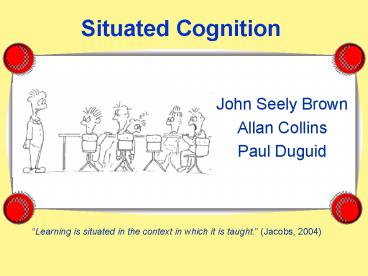Situated Cognition - PowerPoint PPT Presentation
1 / 15
Title:
Situated Cognition
Description:
Facilitation - Internalize information. Assessment - Cognitive growth. Learning Communities ... http://www.gsu.edu/~mstswh/courses/it7000/papers/situated.htm. ... – PowerPoint PPT presentation
Number of Views:1306
Avg rating:5.0/5.0
Title: Situated Cognition
1
Situated Cognition
- John Seely Brown
- Allan Collins
- Paul Duguid
Learning is situated in the context in which it
is taught. (Jacobs, 2004)
2
Situated Cognitive Theory
- Situations co-produce knowledge through activity.
- Knowledge is a product of
- Activity
- Context
- Culture
3
Goals of Situated Cognition
- Allow learner to apply
- knowledge to day-to-day situations
- Retrieve knowledge when needed
- Brings together individual and environment
4
Knowledge
Know What! Know How?
- Individual working knowledge conceptual
knowledge understanding. - Knowledge is the result of group and individual
learning activities along with any situations.
5
Cognitive Apprentices
- Expert Novice
- Community of Practice
6
Community of Practice
- Embed learning in activity
- Use of social physical context
- Learning is
- demand driven
- a social act
- creates individual identity formation
7
Community Apprentice
- Learners perceive
- Implicit Knowledge
- Explicit Knowledge
- By observing experts
- Workplace
- Educational environment
8
Brown, Collins Duguid say . . .
- Traditional Education
- Separation between knowing and doing
- Knowledge treated as integral, theoretically
independent, and self-sufficient.
9
Brown, Collins Duguid say . . .
- Learners
- use tools as practitioners
- Within disciplines community
- Within a dominant culture
- As Cognitive Apprentices
- Social interaction in communities of practice is
crucial - Novices learn by watching Experts
- Sideline of community to fully participating
members
Enculturation!
10
Knowledge . .
- Situated and Evolving through Activity
11
What does this mean for Instructors?
- Understand motivation
- Learning is best presented through realistic and
complex problems. - Process of enculturation and adapting cognitive
tools
12
Instructors Role . . .
- Moves away from providing structuring
information - Focuses on modeling, coaching, collaborating, and
scaffolding. - Create knowledge to solve contextual real-life
problems.
Traditional Education . . .
Blah, Blah, Blah
. . . Form and structure
13
Situated learning Environments
- Four concepts
- Context - environment, setting
- Content - concepts, activities, situations
- Facilitation - Internalize information
- Assessment - Cognitive growth
14
Learning Communities
- Built upon
- Situatedness - embedded learning in rich social
situations (context) - Commonality - creates a sense of enculturation
and identity - Interdependency - share expertise and perspective
- Infrastructure - mechanism for accountability
through structure
15
Mediography
- Bredo, E., (1994). Reconstructing educational
psychology Situated cognition and deweyian
pragmatism. Educational Psychologist, 29(1), 23. - Brown, J., Collins, A., Duguid, P. (1989).
Situated cognition and the culture of learning.
Educational Researcher, 18(1), 32-42. - Hung, D., Der-Thang, C. (2001). Situated
cognition, Vygotskian thought and learning from
the communities of practice perspective
Implications for the design of web-based
e-leaning. Education Media International, 38(1),
3-10. - Jacobs, M. (2004). Situated Cognition. Retrieved
November 12, 2004, from http//www.gsu.edu/mstswh
/courses/it7000/papers/situated.htm.
Situated Cognition































